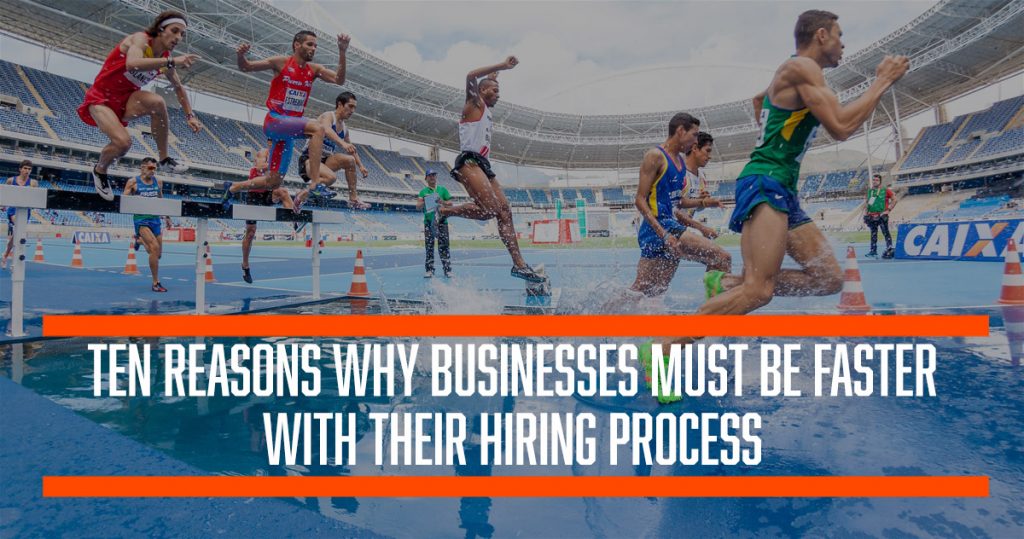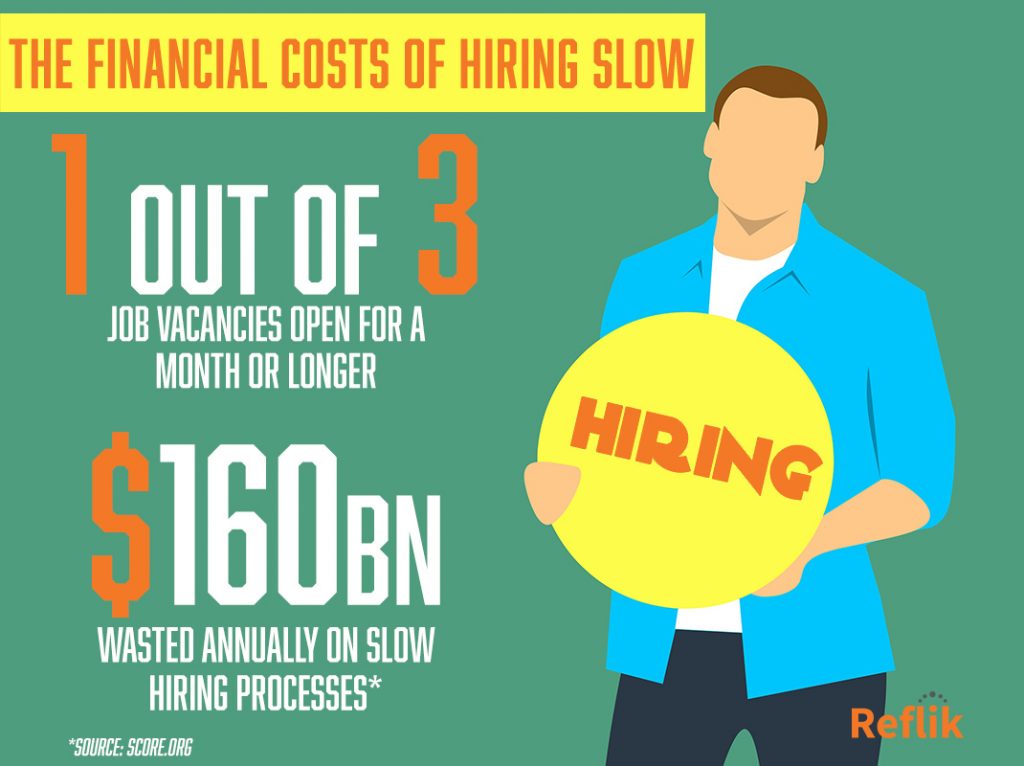
In a tight job market, the costs of hiring slowly are more significant than most hiring managers and talent acquisition teams realize. Current Bureau of Labor Statistics data shows that unemployment is lower than it has been for over a decade. Industry analysts warn now that it is too low for long-term sustainability.
From a job seeker’s perspective, this is a positive situation. It means they may leave one job and experience no great difficulty in acquiring relevant employment elsewhere. From an employer’s perspective, this buyer’s market makes hiring difficult. Ghosting, where a contact goes silent and doesn’t respond to attempts at communication – a problem once limited to the world of online dating – is now common in recruitment. Employees are accepting jobs and then either canceling on the Friday before the Monday they are due to start a new job, or simply not turning up for work on day one because they had another, better, offer.
1.) A Slow Hire Has A High Total Financial Cost
Businesses are missing out on hiring top talent. In some cases, this is an avoidable situation as they are not moving fast enough. In 2015, it was calculated that an incredible 1/3 of job vacancies were open for a month or longer in the US. The total monthly cost incurred by US businesses was $13bn. That means around $160bn is wasted every year on businesses failing to hire new employees in a reasonable time.
Missing out on the ideal candidate requires hiring a second, third or even a fourth choice. A UK analyst calculated the average cost of a bad middle-management hire to be £132,000, or around $180,000-$200,000 USD.
2.) The Best Talent Doesn’t Want To Wait For Slow Offers
 The hiring process is a careful process of whittling down options until selecting the right candidate. Given the current employment market, the situation is identical for a potential employee too. They will keep their interest in an opportunity until they are sure there is something better available. The more highly skilled a candidate is, the more demand there is for their services, the more opportunities will be open to them and the faster they are likely to receive an attractive offer. Once they have a firm offer on the table that appeals, they will take it. At the late stage, they are unlikely to wait to see what others might offer.
The hiring process is a careful process of whittling down options until selecting the right candidate. Given the current employment market, the situation is identical for a potential employee too. They will keep their interest in an opportunity until they are sure there is something better available. The more highly skilled a candidate is, the more demand there is for their services, the more opportunities will be open to them and the faster they are likely to receive an attractive offer. Once they have a firm offer on the table that appeals, they will take it. At the late stage, they are unlikely to wait to see what others might offer.
A business may not be able to do anything about an employee receiving an offer that is too good to reject, the situation can improve by making an attractive offer early enough in the process. Some hiring companies are caught in the “Purple Squirrel” mentality, believing there is always a better choice that will match their exact wish list.
3.) A Lost Competitive Advantage
The average time to hire has increased from 44 to 50 days. Top talent could easily go elsewhere in this time. When this happens, the hiring process and all involved must usually go back to the beginning to find another candidate. This slows the process even further. The long-term effect for the business is that you must now proceed down the list to the second, third, and sometimes even the fourth-choice candidate to fill a role. It is not an ideal situation as there will be reasons why the fifth person in your preferred candidate list is fifth and not second or first. The problem is that these preferred top candidates are now working for your competitors with all the skills, experiences, ambition, and drive for which you had selected that candidate as your preferred candidate.
The philosophy of the modern employment market is that there is a world of choice for the candidate. A fast hire will increase the likelihood of hiring top choices instead of settling for lower-placed options.
4.) Careful Consideration and Slow Hiring are Not the Same Things
It is understandable in the current environment that businesses want to take their time to ensure they make a good hiring decision. Hiring is expensive with many benefits for the right hire and negative consequences for a bad hire. It is important to remember that it is possible to make the right decision, to consider all options and make an effective hire without unnecessarily slowing down the process. Most decisions are slow because it requires signatures or other authorization from higher levels, not because the manager responsible for hiring is still acquiring information.
If your company can reduce bottlenecks to like the chain of authorization to expedite a hire, it should be a matter of priority to do so. It is a buyer’s market and candidates will take good offers as they arise. The longer the process, the higher the chance you lose a candidate, and the higher the cost to your organization as you are forced to restart the hiring process.
5.) The Threat of a Bidding War Means Higher Salaries
The employment market is now at a stage where some candidates are effectively treating offers of employment like an auction. Auctions have the potential to descend into a bidding war where stakeholders keep upping the bid in a determination to win the prize of the candidate’s experiences and skills. A slow hire will increase not only the chances that your business will lose a top candidate to a potential competitor. If you are successful in hiring that person, the salary and benefits cost will be much higher than quickly securing the candidate. Statistics suggest as much as 25% more human resource cost is added when the hiring process is slower. The slower your hiring process, the more time a candidate has to shop their skills around and solicit better offers, which likely increases their cost to you.
The largest single cost of any business is the salary and benefits package. Letting a hiring process persist for longer than it needs to persist means this large cost becomes even larger.
6.) The Hidden Costs of Hiring
 Costs of hiring include the final salary and benefits scheme. There are also indirect costs associated with a slow hire. These include the time taken out of the working day to interview candidates, the review meetings to consider the candidates, the cost of calling candidates in for second or third interviews and all the time resources that will entail for everyone involved in the process. These elements are difficult to effectively cost as it is not always easy to put a dollar value on each individual task. However, the hiring process costs rather than generates money in diverting employees away from the tasks for which they are paid.
Costs of hiring include the final salary and benefits scheme. There are also indirect costs associated with a slow hire. These include the time taken out of the working day to interview candidates, the review meetings to consider the candidates, the cost of calling candidates in for second or third interviews and all the time resources that will entail for everyone involved in the process. These elements are difficult to effectively cost as it is not always easy to put a dollar value on each individual task. However, the hiring process costs rather than generates money in diverting employees away from the tasks for which they are paid.
An effective cost-benefit analysis may be difficult to calculate for each employee’s time spent on contributing to hiring. Being mindful of how time is money in removing employees from other daily tasks should lead to a faster hire.
7.) Lost Productivity Means Lost Revenue
The reason you are hiring is likely one of two reasons. The first is that you are hiring to replace an employee who has left the company, the department, moved offices or gained a promotion. The second is that the business is in a period of expansion and needs the extra human resource for the available workload and the increased capacity in anticipation of projected increased growth. Your existing employees only have so many hours in a working week to carry out the tasks for which they are responsible. Other work is set aside, and you may need to delay or reject work if your employees are already overburdened.
Speeding up the hiring process relieves the burden of overwork on your current employees, reduces stress, and allows you to continue to expand effectively. Stress costs US businesses approximately $300bn every year.
8.) It Damages a Carefully Nurtured Reputation
A business reputation is everything. It can take years to build but can equally be lost in a moment. Social media and professional networking have made it far easier for a talent pool to share information. They may be rivals at times, but they are also peers and contacts, friends and colleagues. If a business has a poor reputation for hiring, being disorganized or slow, it will affect their overall reputation. The best candidates are unlikely to express interest in any opportunities your business may present if they perceive that it will be a waste of their time. Eventually, it will be difficult to attract any top talent no matter how attractive the package.
While careful consideration is both reasonable and advisable, unnecessary delays will have a long-term impact on an organization’s reputation for hiring.
9.) Frustrates the Department Manager and Their Team
In most businesses, the department manager where the new employee will work is not responsible for the hire, even when they are the interviewer and the person who chooses the candidate pool, and makes the final selection. It must be signed off by a senior manager or executive with the offer coming from HR. When delays are purely down to paperwork and respecting the chain of authorization, it leads to frustration for the manager who has already decided which of the candidates they would like in their team. Every day of delay is another day of frustration for the employees expected to cope with the extra workload, and an extra day that the hiring manager has fewer resources than he or she needs.
Hiring any new employee is a team effort. While procedures are in place for a reason, to expedite a hire will help not only the new employee, but existing employees too.
10.) It Impacts Your Customers
Ultimately, the most important person to a business is the customer. Without customers, there is no business. An employee base that is understaffed is not able to perform all the tasks required of it. Customers are forgotten, ignored, or worse in some businesses – passed over because there simply isn’t enough of a workforce to cope with the customer influx. This is just as true for a SaaS agent as it is for a retail outlet, and for an international courier as it is for a restaurant. When emails are not answered and phone calls are not picked up, the customer will go somewhere they, and their money will feel valued.
The potential cost of a slow hire has far broader implications than we might at first consider. The money set aside for the salary and benefits package may be a short-term saving, but there are potential long-term consequences.
There are Few Benefits to a Slow Hire and Considerable Downsides
Big business decisions require a degree of caution; undoubtedly, hiring top talent is a big business decision as it is an investment in a person and their skills and experiences. It is possible to be too cautious about the hiring process. If your business routinely loses potential candidates to competitors or other industries, your market share and profitability may suffer in the long-term. Your final candidate choice is unlikely to be the best match and may end up a poor fit because all other candidates for a role either decided to remain in their current role or accept an alternative offer.

